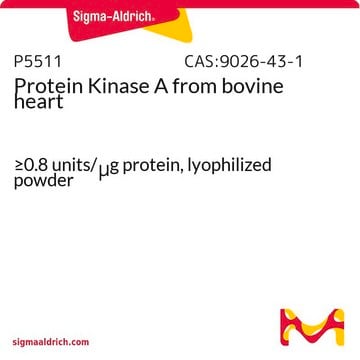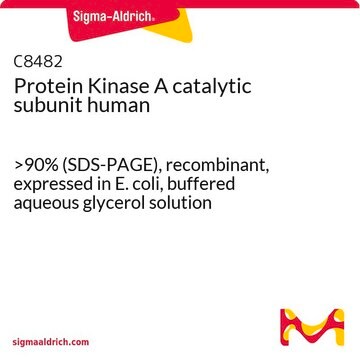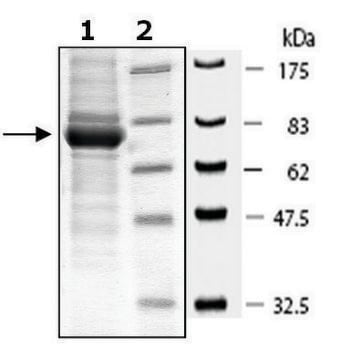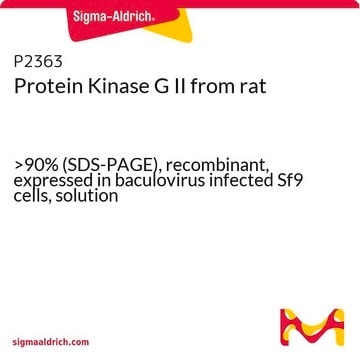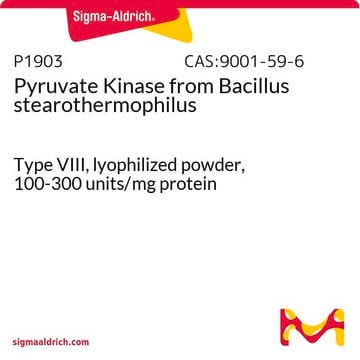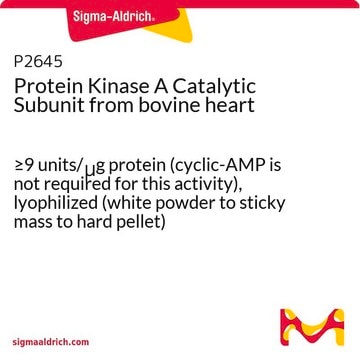P3738
Protein Kinase G Iβ human
≥95% (SDS-PAGE), recombinant, expressed in baculovirus infected Sf9 cells, buffered aqueous glycerol solution
Synonym(s):
cyclic-Guanosine Monophosphate-dependent Protein Kinase 1β human
Sign Into View Organizational & Contract Pricing
All Photos(1)
About This Item
MDL number:
UNSPSC Code:
12352204
NACRES:
NA.54
Recommended Products
recombinant
expressed in baculovirus infected Sf9 cells
Quality Level
Assay
≥95% (SDS-PAGE)
form
buffered aqueous glycerol solution
specific activity
≥1.5 units/mg protein (20-fold stimulation by cGMP (5 μM))
mol wt
76 kDa (monomer)
UniProt accession no.
relevant disease(s)
cancer
shipped in
wet ice
storage temp.
−20°C
Gene Information
human ... PRKG1(5592)
Application
Protein Kinase G is a serine/threonine-specific protein kinase that is activated by cGMP. Protein Kinase G Iβ is used to induce apoptosis and inhibit cell proliferation.
Biochem/physiol Actions
Protein Kinase G Iβ induces apoptosis in certain cell lines such as human breast cancer cell lines MCF-7 and MDA-MB-468. It inhibits cell proliferation and induces apoptosis in colon cancer cell lines.
Unit Definition
One unit will phosphorylate 1 micromole of VASPtide(RRKVSKQE) substrate per minute in 10 mM HEPES, pH 7.4, 5 mM MgCl2, 1 mM DTE and 0.2 mM EDTA.
Physical form
Solution in 20 mM Tris buffer, pH 7.4, 1 mM EDTA, 1 mM β-mercaptoethanol, 100 mM NaCl, 10 U/ml Trasylol, and 50% glycerol.
Storage Class Code
10 - Combustible liquids
WGK
WGK 2
Flash Point(F)
Not applicable
Flash Point(C)
Not applicable
Choose from one of the most recent versions:
Already Own This Product?
Find documentation for the products that you have recently purchased in the Document Library.
Atsuko Deguchi et al.
Cancer research, 65(18), 8442-8447 (2005-09-17)
Recent studies indicate that the induction of apoptosis in human colon cancer cells by certain nonsteroidal antiinflammatory drugs involves increased expression of 15-LOX-1 and synthesis of its major product 13-S-hydroxyoctadecadienoic acid (13-S-HODE). Evidence was obtained that this occurs via a
D Pöhler et al.
FEBS letters, 374(3), 419-425 (1995-11-06)
Detailed studies of differences in distinct cGMP kinase isoforms are highly dependent on expression of large amounts of these enzyme isoforms that are not easily purified by conventional methods. Here cGMP-dependent protein kinases, the type I beta soluble form from
Faranak Fallahian et al.
Cell biochemistry and function, 30(3), 183-190 (2011-11-19)
Activation of protein kinase G (PKG) by cyclic guanosine 3,5-monophosphate (cGMP) has become of considerable interest as a novel molecular approach for the induction of apoptosis in cancer cells. This study was conducted to investigate the role of PKG isoforms
Our team of scientists has experience in all areas of research including Life Science, Material Science, Chemical Synthesis, Chromatography, Analytical and many others.
Contact Technical Service